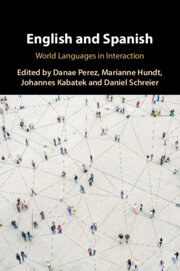Book contents
- English and Spanish
- English and Spanish
- Copyright page
- Contents
- Figures
- Tables
- Contributors
- 1 Introduction: English and Spanish in Contact – World Languages in Interaction
- 2 The Emergence of Global Languages
- 3 Some (Unintended) Consequences of Colonization
- 4 Dialect Contact and the Emergence of New Varieties of English
- 5 The Emergence of Latin American Spanish
- 6 Creole Distinctiveness?
- 7 Contact Scenarios and Varieties of Spanish beyond Europe
- 8 Pluricentricity and Codification in World English
- 9 Spanish Today
- 10 Uncovering the Big Picture
- 11 Morphosyntactic Variation in Spanish
- 12 English and Spanish in Contact in North America
- 13 ‘The Spanish of the Internet’: Is That a Thing?
- 14 Alternating or Mixing Languages?
- 15 The Persistence of Dialectal Differences in U.S. Spanish
- 16 Identity Construction
- Index
- References
8 - Pluricentricity and Codification in World English
Published online by Cambridge University Press: 17 September 2021
- English and Spanish
- English and Spanish
- Copyright page
- Contents
- Figures
- Tables
- Contributors
- 1 Introduction: English and Spanish in Contact – World Languages in Interaction
- 2 The Emergence of Global Languages
- 3 Some (Unintended) Consequences of Colonization
- 4 Dialect Contact and the Emergence of New Varieties of English
- 5 The Emergence of Latin American Spanish
- 6 Creole Distinctiveness?
- 7 Contact Scenarios and Varieties of Spanish beyond Europe
- 8 Pluricentricity and Codification in World English
- 9 Spanish Today
- 10 Uncovering the Big Picture
- 11 Morphosyntactic Variation in Spanish
- 12 English and Spanish in Contact in North America
- 13 ‘The Spanish of the Internet’: Is That a Thing?
- 14 Alternating or Mixing Languages?
- 15 The Persistence of Dialectal Differences in U.S. Spanish
- 16 Identity Construction
- Index
- References
Summary
This chapter examines the relationship between English as a pluricentric language with multiple varieties and the instruments of codification that stabilize the variation within their individual lexica. It compares the different types of dictionaries published for settler Englishes (Australian, New Zealand, Canadian, US) with those published for indigenized Englishes (South Africa, India, Singapore, the Philippines), finding that the former have several types of dictionaries (historical and contemporary, with partial or comprehensive coverage of the lexicon), whereas the indigenized varieties have few with limited coverage of the varietal lexicon. Other codificatory instruments, e.g. style manuals, are found with settler varieties but not indigenized ones. The range of such instruments for settler varieties thus correlates with their advanced stage of evolution (beyond endonormativity). The research shows that only those dictionaries which are produced by regionally based lexicographers are indicators of endonormativity. Dictionaries compiled by foreign/international publishers are associated with varieties that have yet to attain their endonormativity.
Keywords
- Type
- Chapter
- Information
- English and SpanishWorld Languages in Interaction, pp. 139 - 162Publisher: Cambridge University PressPrint publication year: 2021
References
- 2
- Cited by

